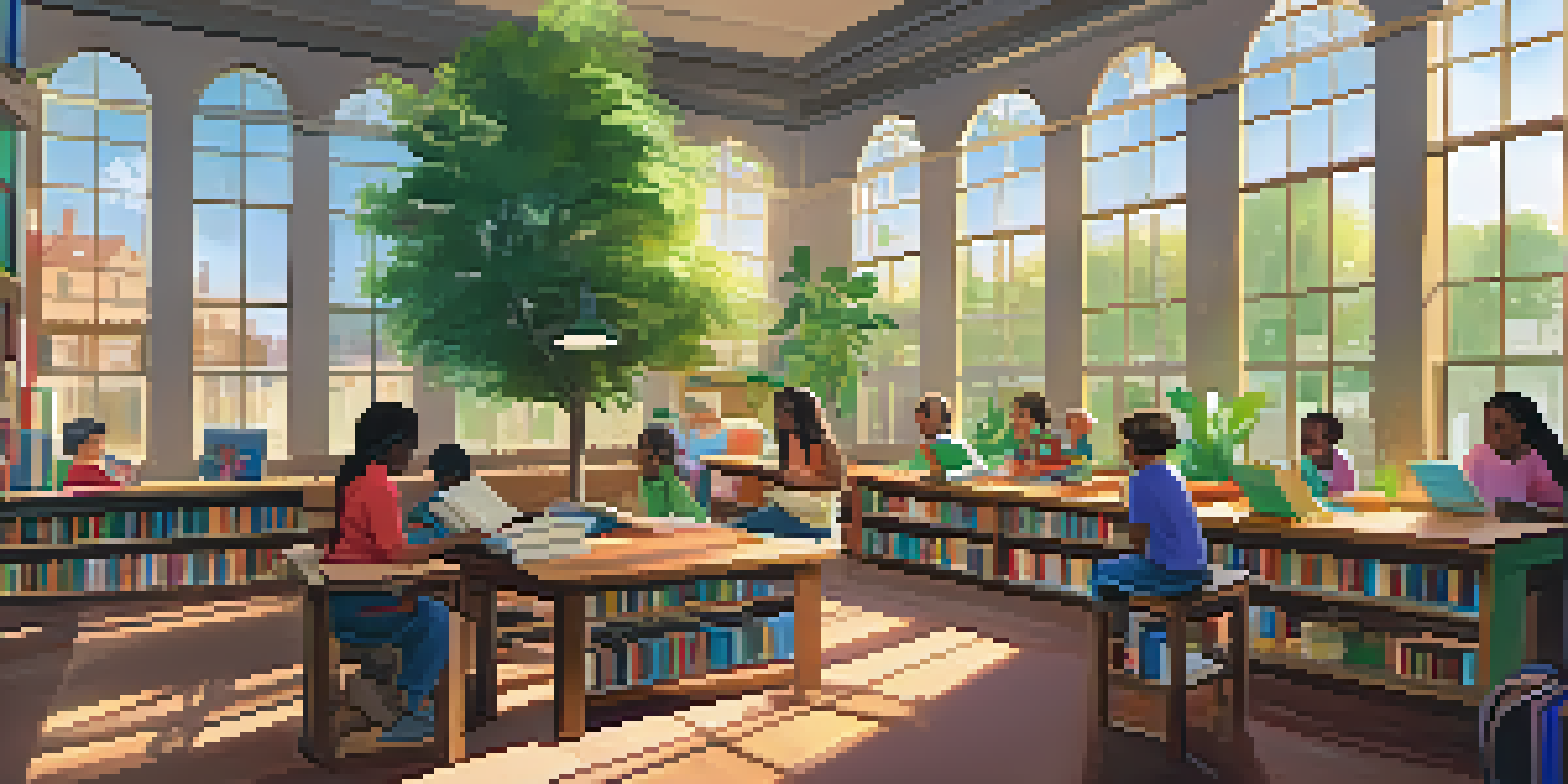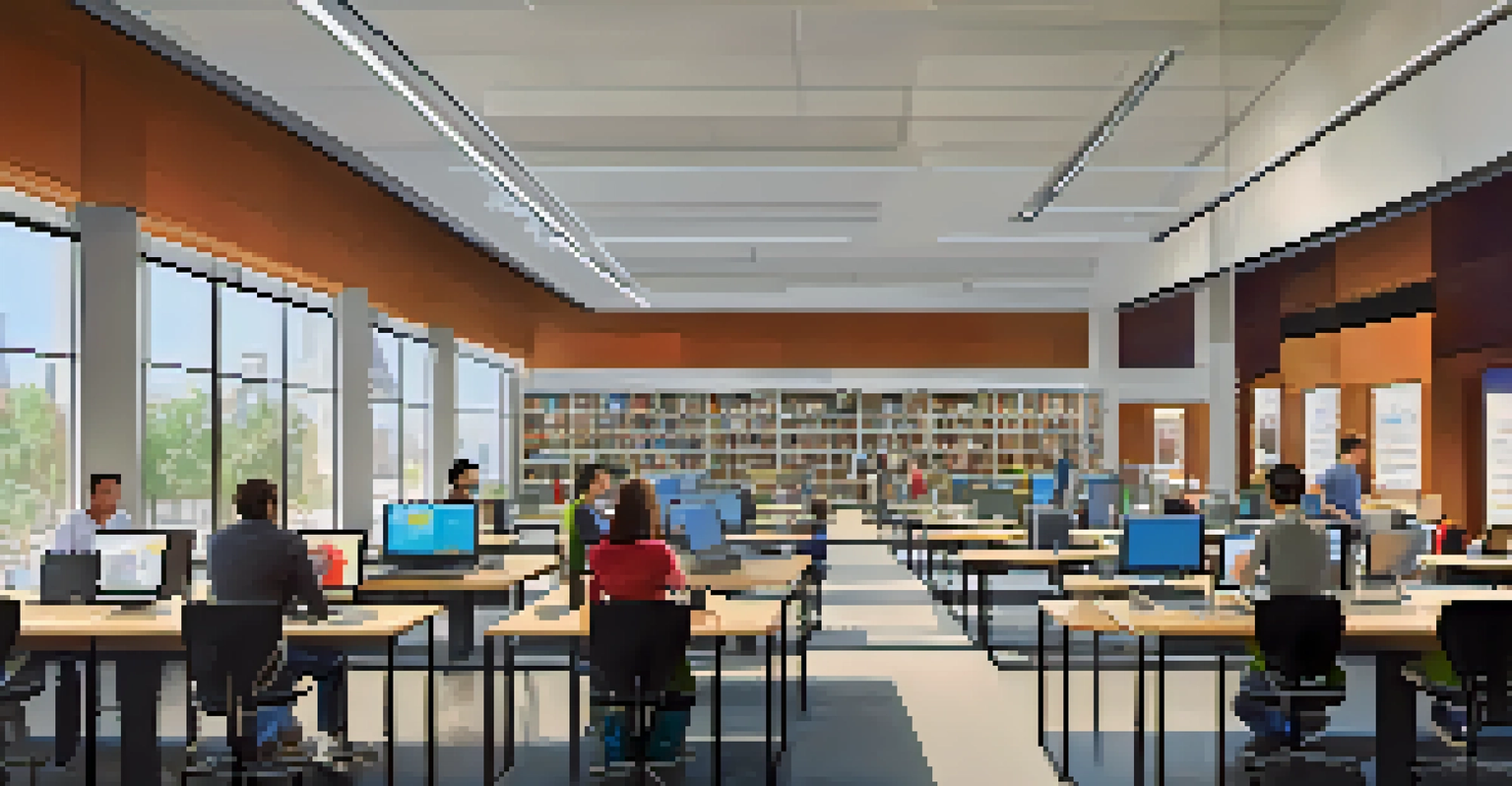The Role of Public Libraries in Fostering Literacy in NYC

Public Libraries as Literacy Hubs in NYC
New York City’s public libraries serve as essential literacy hubs, offering a wealth of resources for individuals of all ages. They provide access to books, digital content, and educational programs that empower community members to enhance their reading and writing skills. By opening their doors to everyone, these libraries create inclusive spaces where literacy can thrive.
Literacy is a bridge from misery to hope.
In addition to traditional resources, many libraries host engaging events like story hours and book clubs that foster a love of reading among children and adults alike. These events not only encourage literacy but also promote social interaction and community bonding. It’s not just about reading; it’s about building connections through shared stories and experiences.
Moreover, public libraries often collaborate with local schools and organizations to extend their reach and impact. By partnering with educators, they can tailor programs that meet the specific literacy needs of the community, ensuring that no one is left behind in their literacy journey.
Innovative Literacy Programs for All Ages
NYC public libraries have developed innovative literacy programs designed to cater to diverse age groups and backgrounds. For instance, programs like 'Read to Succeed' target younger audiences, helping them develop foundational literacy skills through fun and interactive methods. These initiatives ignite a passion for reading from an early age, setting the stage for lifelong learning.

For adults, libraries offer classes in English as a Second Language (ESL) and digital literacy, equipping them with essential skills for navigating today’s world. These classes not only improve reading and writing abilities but also enhance overall confidence and employability. It’s a powerful reminder that literacy is a gateway to opportunity.
Libraries Foster Community Literacy
NYC public libraries serve as vital literacy hubs, providing resources and programs that empower individuals of all ages to enhance their reading and writing skills.
Additionally, many libraries hold workshops focused on financial literacy and health literacy, recognizing that reading extends beyond books. By addressing practical, real-world skills, these programs empower individuals to make informed decisions, thereby improving their quality of life.
Technology and Literacy: A Modern Approach
In our digital age, NYC public libraries have embraced technology as a vital tool for fostering literacy. They provide access to computers, tablets, and the internet, ensuring that everyone can engage with digital content. This access is crucial, as many educational resources are now available online, making digital literacy just as important as traditional reading skills.
The more that you read, the more things you will know. The more that you learn, the more places you'll go.
Libraries also offer online databases and e-books, allowing patrons to explore a vast array of information from the comfort of their homes. With the rise of remote learning, these resources have become even more essential, bridging the gap between traditional and modern literacy. This flexibility empowers individuals to learn at their own pace and convenience.
Moreover, libraries often provide training sessions on using technology effectively, helping patrons navigate everything from e-book readers to online research tools. By demystifying technology, public libraries play an important role in ensuring that everyone can participate in the digital world, reinforcing the idea that literacy is an ever-evolving concept.
Community Engagement through Literacy Events
Public libraries in NYC are not just about books; they are vibrant community centers that host a variety of literacy-related events. From author talks to poetry slams, these events engage the community and promote literacy in a dynamic way. They provide opportunities for individuals to express themselves and connect with others who share similar interests.
Furthermore, events like literacy festivals celebrate the joy of reading while showcasing local authors and artists. These gatherings create a festive atmosphere that encourages participation and fosters a sense of belonging. By making literacy a community celebration, libraries help to cultivate a culture of reading that resonates throughout the city.
Innovative Programs for All Ages
Libraries offer diverse literacy programs, such as ESL and digital literacy classes, that cater to different age groups and backgrounds, promoting lifelong learning.
Additionally, libraries often invite community members to share their own stories, creating a platform for diverse voices and experiences. This inclusion enriches the literary landscape and inspires others to explore their own narratives, reinforcing the idea that everyone has a story worth telling.
Supporting Underserved Communities
One of the most significant roles of public libraries in NYC is their commitment to serving underserved communities. Many families in these areas may lack access to books and educational resources, making libraries a crucial lifeline for literacy development. By providing free access to materials and programs, libraries help to level the playing field.
In addition to resources, libraries often conduct outreach initiatives to reach those who may face barriers to accessing traditional services. By bringing literacy programs directly into neighborhoods, they ensure that everyone has a chance to learn and grow. This proactive approach demonstrates the libraries' dedication to equity in literacy.
Moreover, libraries collaborate with local nonprofits and schools to create tailored programs that address specific community needs. By focusing on the unique challenges faced by different groups, they create effective solutions that empower individuals to overcome obstacles and thrive.
The Impact of Literacy on Personal and Community Growth
Literacy is more than just the ability to read and write; it’s a fundamental skill that impacts personal and community growth. For individuals, improved literacy opens doors to better job opportunities, higher education, and enhanced quality of life. When people can read and comprehend information, they are better equipped to navigate their lives and advocate for themselves.
On a community level, higher literacy rates contribute to stronger civic engagement and social cohesion. Literate individuals are more likely to participate in community discussions, vote, and take part in local initiatives. This active participation cultivates a sense of responsibility and connection among residents, further strengthening the fabric of the community.
Technology Enhances Learning Access
By embracing technology, public libraries provide essential digital resources and training, ensuring that everyone can engage with modern literacy tools effectively.
Ultimately, public libraries play an invaluable role in fostering this growth. By nurturing literacy, they empower individuals and contribute to the overall well-being of society, illustrating that when one person learns, the entire community flourishes.
The Future of Literacy in NYC Libraries
As we look to the future, public libraries in NYC are poised to continue their vital role in promoting literacy amidst changing societal landscapes. With advancements in technology and shifts in educational needs, libraries are adapting their services to meet new challenges head-on. This adaptability ensures that they remain relevant and impactful.
Libraries are increasingly integrating new technologies into their literacy programs, such as virtual reality and interactive learning tools. These innovations enhance the learning experience, making literacy more engaging and accessible to diverse audiences. By embracing change, libraries can attract a new generation of readers and learners.

Moreover, as community needs evolve, libraries are committed to ongoing assessment and improvement of their programs. They actively seek feedback from patrons and local organizations to tailor their offerings, ensuring they continue to meet the literacy needs of all New Yorkers. This dedication to growth reinforces the notion that public libraries are not just static institutions; they are dynamic spaces that evolve with their communities.